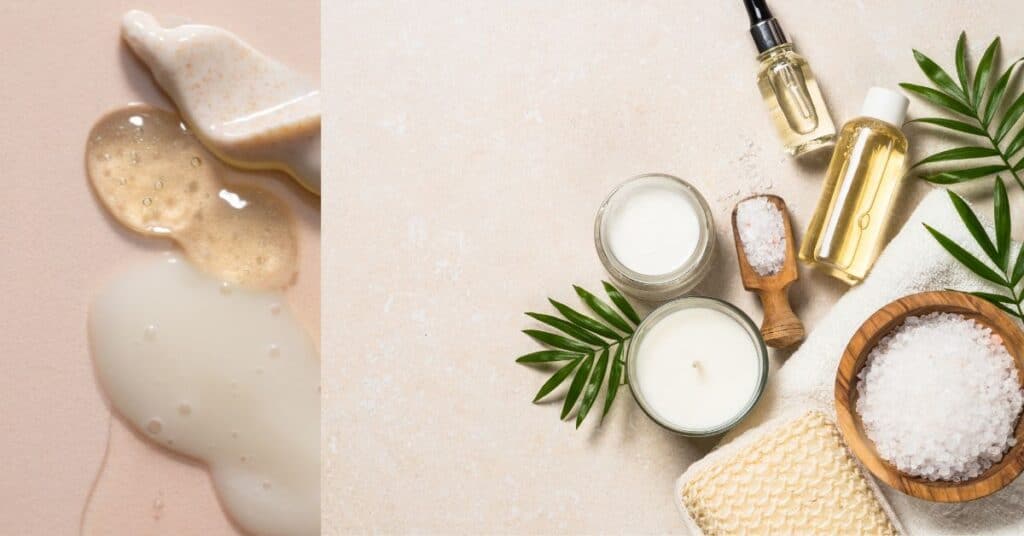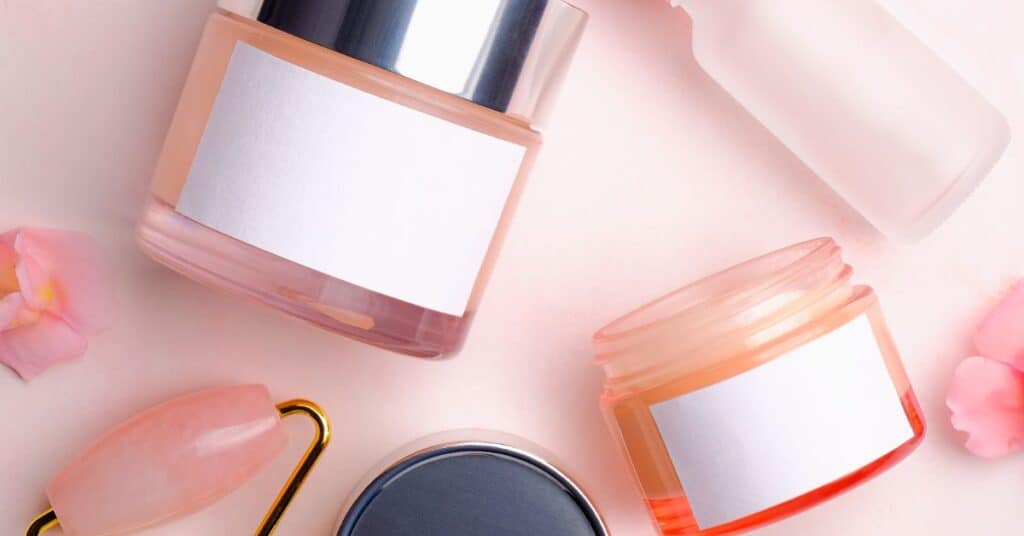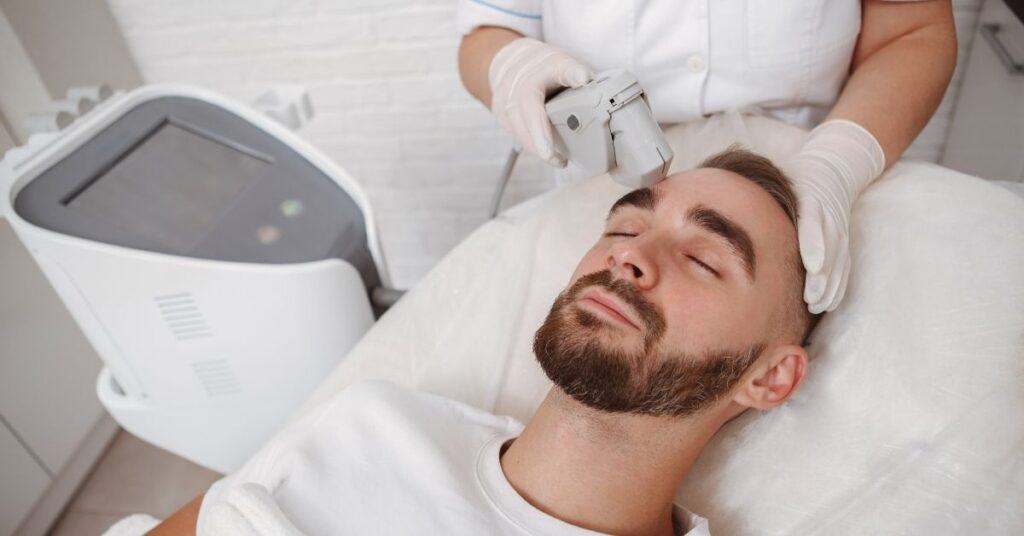Table of Contents
- What are Skincare and Cosmetics?
- The Three Classifications Of Cosmetics Are
- How do Skincare and Cosmetics Differ?
- What Are Personal Care Products?
- Costs Of Skincare And Cosmetics
- Risks Of Skincare And Cosmetics
- Skincare Vs. Cosmetic Which Is Better for Your Skin?
- Conclusion
Is there a difference between cosmetic and skincare products? Yes!
Whether it is a moisturizer, a cleanser, a foundation, or a lipstick, these products can enhance your beauty and confidence.
There are different purposes for cosmetics products, such as personal care, skin care, or protecting the skin.
Skincare and cosmetics are often used interchangeably, yet they represent distinct philosophies regarding achieving and maintaining a beautiful appearance.
We delve deep into skincare and cosmetics, unraveling their unique attributes, ingredients, effects, costs, risks, and benefits.
And how to effectively incorporate them into your beauty routine.
What are Skincare and Cosmetics?
Skincare
Skincare, often considered the foundational pillar of beauty, is all about nurturing your skin from within.
It’s a holistic approach that prioritizes long-term health and radiance.
The first step in achieving great skin is identifying your skin type – whether it’s oily, dry, combination, or sensitive.
This knowledge forms the basis for selecting the right products that cater to your skin’s unique needs and knowing the right order to apply them.
They include products such as cleansers, toners, moisturizers, serums, masks, exfoliators, sunscreens, retinoids, retinol, and treatments.
Skincare products can target specific skin concerns, such as acne, dryness, wrinkles, or pigmentation.
Cosmetics
Cosmetic products are products that are designed to enhance or alter the appearance of your skin.
When applied to the skin’s outer surface, cosmetic skincare is unable to penetrate the epidermis and reach the dermis, where visible changes can occur due to insufficiently strong, active ingredients.
The dermis is where our fibroblasts, collagen, and elastin are produced.
Although cosmetic skincare cannot penetrate the dermis, it can exfoliate, add fragrance, and hydrate the skin’s surface.
Cosmetic products can enhance the skin’s brightness and texture, resulting in a smoother and more even appearance.
Skincare and cosmetic products can be used separately or together. People have different preferences when it comes to skincare and cosmetics.
Some people prefer to use only skincare products to keep their skin healthy and natural.
In contrast, others prefer to use only cosmetic products to cover up their skin flaws and express their personalities.
Still, others like to use a combination of both skincare and cosmetic products to achieve a balance between health and beauty.
The Three Classifications Of Cosmetics Are
Decorative Cosmetics: These are products used to enhance or alter a person’s appearance without necessarily providing long-term benefits to the skin.
Examples include makeup products like lipstick, eyeshadow, foundation, and nail polish.
Care Cosmetics: These products are designed to provide specific benefits to the skin.
Skincare products, hair care products, and products like toothpaste and deodorant fall under this category.
They are intended to promote the health and well-being of the skin, hair, and other parts of the body.
Functional Cosmetics: These are products that serve a specific purpose beyond just appearance enhancement.
They include products like sunscreens, anti-aging creams, and acne treatments.
These products provide both cosmetic benefits (improving appearance) and functional benefits (protecting or treating the skin).
How do Skincare and Cosmetics Differ?
Skincare: Nourishing Your Canvas
Skincare, often considered the foundational pillar of beauty, is all about nurturing your skin from within.
It’s a holistic approach that prioritizes long-term health and radiance.
The first step in any skincare routine is to determine your skin type, be it oily, dry, combination, or sensitive.
This knowledge forms the basis for selecting the right products that cater to your skin’s needs.
Cosmetics, in contrast, are like an artist’s palette, allowing you to accentuate your features, experiment with colors, and express your unique style.
While skincare provides the foundation, cosmetics provide the opportunity to have fun and be creative.
Cosmetics excel in creating a flawless base.
Foundation, concealer, and powder work in harmony to cover imperfections, even out skin tone, and provide a smooth canvas for further artistry.
The secret to a natural-looking finish is to select products that suit your skin tone and undertone.
What Are Personal Care Products?
Cleansing and Exfoliation
A healthy skincare routine starts with proper cleansing.
Cleansing not only removes dirt and impurities but also paves the way for better product absorption.
A mild cleanser tailored to your skin type ensures a clean slate for subsequent steps.
Regular exfoliation further enhances this process by sloughing off dead skin cells, promoting cell turnover, and revealing a fresher complexion beneath.
Hydration and Moisturization
Hydration is essential for youthful skin. A well-hydrated complexion looks plumper and more radiant. This is where moisturizers come in.
Moisturizers help to lock in moisture and protect the skin from the elements. They can also help to reduce the appearance of fine lines and wrinkles.
They lock in moisture, creating a protective barrier against environmental stressors.
Incorporating serums enriched with antioxidants and hyaluronic acid can supercharge your hydration game, imparting a healthy glow.
Sun Protection
No skincare routine is complete without sunscreen.
Shielding your skin from harmful UV rays is essential in preventing premature aging and maintaining an even skin tone.
Opt for a broad-spectrum sunscreen with at least SPF 30 to ensure comprehensive protection.
Skincare products such as serums, toners, essences, retinoids, masks, and spot treatments are all used to improve the appearance and health of the skin.
Eyes and Lips
Eye shadows, eyeliners, and mascaras are all cosmetic skincare products that can be used to transform your look from subtle to dramatic.
Similarly, lipsticks and lip glosses offer a spectrum of colors to suit any mood or occasion.
Blush and Contour
The contouring and blush application allows you to sculpt your face, emphasizing your bone structure and adding a healthy flush.
Skillful contouring can create the illusion of higher cheekbones and a slimmer nose, enhancing your facial aesthetics.
Costs Of Skincare And Cosmetics
Skincare and cosmetic products have different prices and value for your money.
Skincare products tend to be more expensive upfront than cosmetic products because they use higher-quality ingredients and have longer shelf lives.
Skincare products can save you money in the long run by preventing or reducing the need for other treatments or procedures for your skin.
Cosmetics products tend to be cheaper initially than skincare products because they use lower-quality ingredients and have shorter shelf lives.
Cosmetics products can cost you more money in the long run by requiring more frequent purchases and maintenance for your skin.
Risks Of Skincare And Cosmetics
Skincare and cosmetic products have different potential dangers or side effects for your skin or health.
Skincare and cosmetic products can cause allergic reactions or irritation if you are sensitive to specific ingredients or if you use them incorrectly or excessively.
Some skincare ingredients can also interact with other medications or supplements you may be taking or cause photosensitivity if you expose your skin to the sun.
These include fragrances, preservatives, dyes, metals, and other chemicals.
Some of these chemicals are also classified as endocrine disruptors, which means they may interfere with the body’s hormones and cause adverse health effects.
To prevent this, read the labels of the products carefully and avoid any ingredients that you are allergic or sensitive to.
Some cosmetic ingredients can clog your pores or cause breakouts if you do not remove them effectively or if you use them too frequently.
Products, such as glitter, metallic, or mineral-based eye products, can cause irritation and scratches on the eye if they get into your eyes.
The key is to do a patch test and choose products that are made from healthy, non-toxic ingredients that are suitable for your skin type and needs.
You should also follow the instructions for proper use and storage of the products and dispose of them responsibly.
This will allow you to reap the rewards of skincare and cosmetics without harming your health or the environment.
Skincare Vs. Cosmetic Which Is Better for Your Skin?
Skincare and cosmetics are both products that can be applied to the skin for different purposes.
Skincare products are designed to cleanse, moisturize, protect, and treat the skin.
Cosmetics products are designed to enhance, color, or modify the appearance of the skin.
The difference between skincare and cosmetics is not only in their function but also in their ingredients, regulation, and effectiveness.
Skincare or cosmeceutical products usually contain ingredients that have a beneficial effect on the skin, such as antioxidants, vitamins, peptides, hyaluronic acid, and retinoids.
These ingredients can help improve the skin’s health, texture, tone, and appearance over time.
Products that treat skin diseases like acne and eczema and affect the structure or function of the skin, such as anti-aging or anti-wrinkle products, etc.
They are regulated by the Food and Drug Administration (FDA) as drugs or over-the-counter (OTC) products, depending on their intended use and claims.
Cosmetics are typically made with components that have a cosmetic effect on the skin, such as pigments, oils, waxes, fragrances, and preservatives.
These ingredients can help change the color, texture, or appearance of the skin temporarily.
The answer to which is better for your skin depends on your skin type, needs, preferences, and goals.
Skincare products can provide long-term benefits for your skin health and appearance if you use them regularly and correctly.
Cosmetics products can provide immediate results for your skin appearance if you use them occasionally and sparingly.
Regardless of the product you use, it is always important to read the labels carefully, follow the instructions for use and storage, and test a small area of skin before using a new product.
Avoid any ingredients that you are allergic to, and consult a dermatologist if you have any skin concerns or issues.
Conclusion
The true magic unfolds when skincare and cosmetics harmoniously coexist in your routine.
Instead of pitting them against each other, consider their roles as complementary rather than contradictory.
A nourished and hydrated skin ensures that cosmetics glide on seamlessly while cosmetics enhance and amplify the benefits of your skincare efforts.



